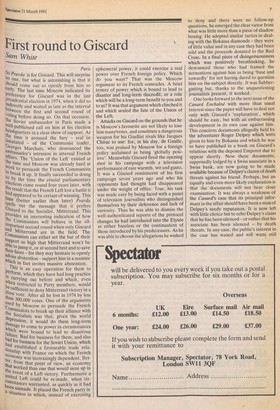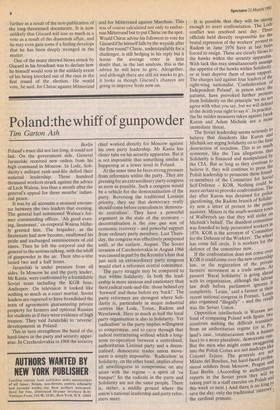First round to Giscard
Sam White
Paris
So Pravda is for Giscard. This will surprise no one but what is astonishing is that it Should come out so openly from him so early. The last time Moscow indicated its preference for Giscard was in the last presidential election in 1974, when it did so indirectly and waited as late as the interval between the first and second round of voting before doing so. On that occasion, the Soviet ambassador in Paris made a Lwell-publicised call on him at his election neadquarters in a clear show of support. At t time it aroused the fury — real or simulated — of the Communist leader, Georges Marchais, who denounced the aMbassador's intrusion in internal French .a,_ffairs. The 'Union of the Left' existed at 'Ile time and Moscow was already hard at Work to persuade the French Communists to break it up. It finally succeeded in doing s? by the time the crucial parliamentary elections came round four years later, with the result that the French Left lost a battle it 'ad appeared to be certain of winning. This tulle (better earlier than later) Pravda ,„sP.ells out the message that it prefers ‘-liscard to the Socialist, Mitterrand. This provides an interesting indication of how !he Communists will behave in the allimportant second round when only Giscard ,..„nd Mitterrand are in the field. The 'otnmunists can either set the bar of their aslIPPort so high that Mitterrand won't be ble. to jump it, or at second best and to save their faces — for they may hesitate to openly atly.tse abstention —support him in a manner Which in fact invites massive abstention. This is an easy operation for them to Perform, which they have had long practice lo carrying out before and which, even nen restricted to Party members, would °e sufficient to deny Mitterrand victory in a ,c11,°se vote. After all he lost in 1974 by less 300,000 votes. One of the arguments ,c'se" by Moscow to persuade the French , wnmunists to break up their alliance with U, Socialists was that, given the world cpPression, it would do them long-term a, tl,tage to come to power in circumstances fkyo. lch were bound to lead to disastrous kallore. Bad for business for them, and also Luad for business for the Soviet Union, which ",acl established a favourable trade relati°nsbip with France on which the French eonomy was increasingly dependent. Better , from that point of view, an economy that worked than one that would sieze up in the event of a Left victory. Furthermore a , united Left could be re-made, when cirtelunstances warranted, as quickly as it had pec,n unmade. It placed the French party in a .situation in which, instead of exercising ephemeral power, it could exercise a real power over French foreign policy. Which do you want? That was the Moscow .argument to its French comrades. A brief tenure of power which is bound to lead to disaster and long-term discredit, or a role which will be a long-term benefit to you and to us? It was that argument which clinched it and which sealed the fate of the Union of the Left.
Attacks on Giscard on the grounds that he is Moscow's favourite are not likely to lose him many'votes, and constitute a dangerous weapon for his Gaullist rivals like Jacques Chirac to use: for, in his day, de Gaulle, too, was praised by Moscow for a foreign policy acclaimed as being 'globally positive'. Meanwhile Giscard fired the opening shot in his campaign with a television performance of rare warmth, wit and gusto. It was a Giscard reminiscent of his first campaign seven years ago and who his opponents had thought had disappeared under the weight of office. True, his task was made easy by being faced with a panel of television journalists who distinguished themselves by their deference and lack of curiosity. Thus he was able to dismiss the well-authenticated reports of the protocol changes he had introduced into the Elyste as either baseless or the continuation of those introduced by his predecessors. As he was able to choose the allegations he wished to deny and there were no follow-up questions, he emerged the clear victor from what was little more than a piece of shadow boxing. He adopted similar tactics in dealing with the Bokassa diamonds — they were of little value and in any case they had been sold and the proceeds donated to the Red Cross. In a final piece of disingenuousness which was positively breathtaking, he denounced those who had framed the accusations against him as being 'base and cowardly' for not having dared to question him on the -subject directly. It was flabbergasting but, thanks to the unquestioning journalists present, it worked. One looks forward to the next issue of the Canard Enchafne with more than usual interest since the paper will have to deal not only with Giscard's 'explanation', which should be easy, but with an embarrassing development in its own case against him. This concerns documents allegedly held by the adventurer Roger Delpey which 'were given to him by Bokassa and which he was to have published in a book on Giscard's relations with the deposed Emperor due to appear shortly. Now these documents, supposedly lodged by a Swiss associate in a Swiss bank, are now going to be made, available because of Delpey's claims of death threats against his friend. Perhaps, but an equally and even more likely explanation is that the documents will not bear close examination. It was always a weakness of the Canard's case that its principal infor mant in the affair should have been a man of Delpey's seedy reputation. It is now left with little choice but to echo Delpey's claim that he has been silenced — or rather that his associate has been silenced — by death threats. In any case, the public's interest in the case has waned and will wane still further as a result of the non-publication of the long-threatened documents. It is now unlikely that Giscard will lose as much as a vote as a result of the diamonds affair, and he may even gain some if a feeling develops that he has been deeply wronged in the matter.
One of the many shrewd blows struck by Giscard in his broadcast was to declare how he himself would vote in the unlikely event of his being knocked out of the race in the first round of the election. He would vote, he said, for Chirac against Mitterrand and for Mitterrand against Marchais. This was of course calculated not only to embarrass Mitterrand but to put Chirac on the spot. Would Chirac advise his followers to vote for Giscard if he himself falls by the wayside after the first round? Chirac, understandably for a challenger, is still hedging in his reply birt it leaves the average voter in little doubt that, in the last analysis, this is the advice he will have to give. Altogether, and although there are still six weeks to go, it looks as though Giscard's chances are going to improve froin now on.







































 Previous page
Previous page